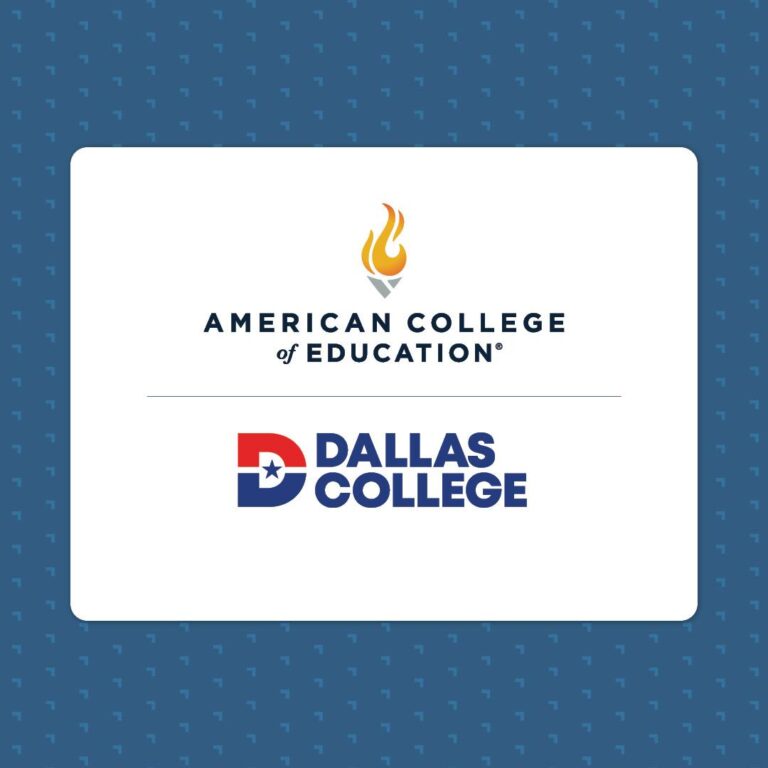Strengthening Nursing Education: A New Collaborative Initiative Between American College of Education and Dallas College
In response to the escalating demand for skilled nursing professionals, American College of Education and Dallas College have expanded their partnership to introduce a specialized Nurse Education Pathway. This initiative is crafted to simplify the educational journey for nursing students by integrating academic rigor with practical experience. By pooling their expertise and resources, these institutions aim to deliver accessible, top-tier nursing education that prepares graduates to meet the complex needs of today’s healthcare systems. This collaboration signifies a pivotal advancement in healthcare workforce development, as highlighted by recent industry reports.
Highlights of the Nurse Education Pathway include:
- Seamless credit transfer agreements that accelerate degree completion timelines
- Flexible course delivery through online and hybrid formats tailored for working adults
- Comprehensive clinical placements coordinated with prominent Dallas-area medical centers
- Ongoing academic advising and career guidance to support student progression and employment readiness
| Program Aspect | Information |
|---|---|
| Program Length | 18 to 24 months |
| Degree Awarded | RN to BSN |
| Instruction Mode | Hybrid and fully online options |
| Clinical Training Locations | Multiple hospitals and healthcare facilities in Dallas |
Broadening Nursing Career Access Through Innovative Educational Pathways
To meet the nationwide shortage of qualified nurses, the partnership between American College of Education and Dallas College has launched a progressive nursing pathway that expands educational access for aspiring healthcare workers. This program is designed with flexibility in mind, accommodating students juggling employment, family responsibilities, and academic goals. It offers a clear progression from foundational courses to advanced nursing qualifications, ensuring a smooth transition for learners at various stages of their careers.
- Adaptable online and hybrid courses that fit diverse schedules and learning preferences
- Accelerated program tracks that reduce time to graduation without sacrificing educational quality
- Credit articulation agreements that facilitate easy transfer between institutions
- Personalized academic and career counseling focused on nursing profession success
By enhancing accessibility and aligning with workforce needs, this pathway equips nurses to thrive in varied healthcare settings. The following table outlines the program’s key phases and typical completion periods:
| Stage | Curriculum Focus | Approximate Duration |
|---|---|---|
| Initial | General Education Foundations | 1 Semester |
| Intermediate | Core Nursing Coursework | 2 Semesters |
| Final | Clinical Practicum and Licensure Preparation | 1 Semester |
Meeting Healthcare Workforce Demands Through Specialized Nursing Programs
Addressing the critical shortage of healthcare professionals, the joint effort by American College of Education and Dallas College introduces a nursing education pathway that emphasizes both theoretical knowledge and practical skill development. This program is designed to align with current healthcare industry standards, ensuring graduates are well-prepared to enter diverse clinical environments. The curriculum incorporates advanced simulation technologies and is delivered by seasoned faculty members dedicated to student success.
The pathway accommodates a wide range of learners, from those beginning their nursing education to experienced nurses seeking further specialization. Core program features include:
- Flexible course formats combining online and face-to-face instruction
- Accelerated degree options tailored for working nursing professionals
- Comprehensive career placement services post-graduation
- Collaborations with local healthcare organizations for immersive clinical experiences
| Feature | Advantage |
|---|---|
| Clinical Simulation Facilities | Enhanced experiential learning and skill mastery |
| Hybrid Online Courses | Convenient scheduling for learners balancing multiple commitments |
| Mentorship Opportunities | Support and guidance from experienced healthcare practitioners |
Enhancing Collaborative Nursing Education Through Strategic Recommendations
To fully leverage the benefits of joint nursing education programs, it is essential for partner institutions to engage in regular curriculum review sessions. These meetings ensure that course content remains aligned with the latest healthcare trends and employer expectations. Establishing open communication channels among faculty, clinical partners, and students is vital for promptly addressing challenges and optimizing educational outcomes. Additionally, integrating interprofessional education can cultivate essential teamwork and communication skills necessary for effective healthcare delivery.
Investing in shared technological resources, such as simulation labs and digital learning platforms, is crucial for enriching the training experience. Equitable access to these tools across institutions enhances practical learning and better prepares students for clinical realities. The table below presents potential models for resource sharing that can improve efficiency and reduce operational costs:
| Resource | Lead Provider | Shared Access Strategy |
|---|---|---|
| Simulation Laboratories | Dallas College | Scheduled rotations for joint student utilization |
| Online Learning Systems | American College of Education | Co-branded courses with cross-institution enrollment |
| Clinical Placement Networks | Both Institutions | Shared database of clinical partners |
Conclusion: Key Insights on the Nursing Education Collaboration
The expanded partnership between American College of Education and Dallas College represents a transformative approach to nursing education, directly addressing the urgent need for qualified nurses. By developing a comprehensive Nurse Education Pathway, the collaboration enhances access to superior nursing programs and equips students with the competencies required to excel in a dynamic healthcare environment. As this initiative evolves, it is poised to significantly contribute to workforce development and educational excellence within the community.






